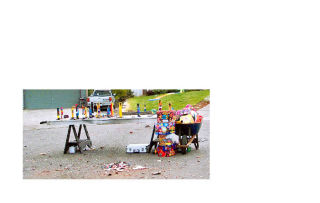MARYSVILLE — Resident Tom Greenlee said that last year fireworks set loose in his neighborhood ignited a bush in front of his home on 54th Place NE.
Greenlee said he wasn’t home at the time, adding a neighbor doused the flames.
This year, Greenlee claims about 100 people gathered in his cul-de-sac for a July 4 celebration that included fireworks blasting off from about 5 p.m. until after midnight. He added the noise forced him to tranquilize his dog.
“I’m not anti-fireworks,” Greenlee said. “If they shot off a few, that would be fine. But it goes on for hours and hours.”
Greenlee also added he is confused about what fireworks are considered “safe and sane,” and therefore legal to use in Marysville, if only during certain hours on July 4 and on New Years Eve.
Greenlee hardly is alone in his complaints about fireworks or in his confusion over what explosives are legal and what aren’t. But at the same time, several city officials reported they received compliments on the steps the city took to control fireworks this year.
“The vast majority of the people I talked to say it was better this year than in past years,” said City Councilwoman Carmen Rasmussen.
Councilman Jon Nehring echoed some of Rasmussen comments.
Nehring said while he received a few complaints, for the first time ever, residents sent him positive e-mails regarding how the city handled fireworks enforcement this year.
Prior to July 4, Council passed new rules allowing city police to hand out civil citations for using illegal fireworks or lighting fireworks outside of the allotted times. Police Cmdr. Rob Lamoureux said officers handed out 12 such citations in the days leading up to July 4.
They also gave out four criminal citations for fireworks offenses. While Lamoureux admitted the totals aren’t huge, he added that the numbers of persons cited was significantly higher than in past years.
Lamoureux said police usually wrote two to four fireworks citations annually.
The civil citations can carry with them a $500 fine. Criminal firework offenses actually can result in higher fines and jail time. But numerous officials said police often were hesitant to hand out criminal charges for fireworks and that processing those complaints was overly time consuming. The hope was that the easier to use civil citations would increase the number of infractions doled out by police.
Both Rasmussen and Nehring noted this was only the second year the city had limited the legal use of any fireworks to July 4, a change in the rules both feel significantly reduced fireworks complaints.
“I’ve always been in favor of as many restrictions as possible,” Nehring said, but there doesn’t seem to be much sentiment among city leaders to completely eliminate firework use. Councilman Jeff Seibert appears to be an exception.
“I’ve been in favor of doing away with them for a few years,” Seibert said.
City Chief Administrative Officer Mary Swenson talked about a Council fireworks discussion that happened a few years ago and that she said attracted a packed house of residents to City Hall.
Swenson added about three-fourths of the crowd was in favor of continuing to allow safe and sane firework use.
So what constitutes a safe and sane firework? Swenson said the state, not the city, defines what fireworks are legal for general consumer use.
A state fire official did not return a phone call requesting clarification. A state Web site largely reflects information contained on the city Web site. Bottle rockets, firecrackers and larger explosives — such as M-80’s or H-100’s — are examples of fireworks that do not meet safe and sane standards. Rasmussen and others said police confiscated plenty of those types off items around July 4.
Nevertheless, Greenlee and others argued so-called mortars that shoot explosives into the air are apparently legal, but that the ashes from those items could prove as hazardous as any bottle rocket.
“I do agree that even some of the legal ones could prove a danger,” Nehring said.
While she did not claim to have the final definition of a “safe and sane” firework, according to Rasmussen, any firework mounted on a stick — such as a bottle rocket — is illegal because of a possible erratic trajectory once it is lit. In the case of mortars, the firing line is presumed to be more directed.
Fireworks questions also seem to extend to jurisdictional issues.
“The noise in our development was unbearable at times and there was more than once when it sounded like bombs were going off,” said local resident Bob Blackeney in an e-mail sent to The Globe.
But Blackeney actually lives just outside the Marysville city limits.
“There is lots of confusion about what is legal in Marysville and what is legal in Snohomish County,” Swenson said, adding the more important differences may exist between Marysville and the adjacent Tulalip Reservation, where most people know that, at least in regards to fireworks, just about anything goes.
Rasmussen summed up by saying reports coming from city police and the local fire district show the number of fireworks complaints and fireworks-related injuries were down compared to previous years.
“Hopefully, things will just get better and better,” she said.



